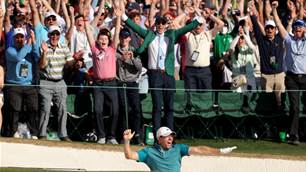In an extraordinary turnaround, England's Danny Willett captured the Masters after Jordan Spieth crumbled on the final nine, writes Golf Australia's Steve Keipert
BY STEVE KEIPERT AT AUGUSTA NATIONAL
IT TURNS out we have Zachariah and Nicole Willett to thank for Danny Willett becoming the first Englishman in 20 years to win the Masters.
The last man to arrive for the 80th Masters Tournament – the man who nearly didn’t play because of the expected due date of his first son – left Augusta National Golf Club with the green jacket draped over his shoulders. Willett was the 89th and final player to register at Augusta after baby Zachariah arrived on March 30, just a week before the tournament began. Rather than become caught up in the pre-major hype that inevitably engulfs players and followers, Willett had the luxury of foregoing it all because he didn’t even know if he’d be playing.
Nicole’s due date was Masters Sunday, one day before her 28th birthday. One reason why Jordan Spieth doesn’t have two green jackets is because nature sent Master Willett into the world early. However, on the 20th anniversary of Greg Norman’s epic Augusta meltdown to gift the Masters to an Englishman, an eerily familiar scenario played out on this hallowed turf in eastern Georgia as Willett authored a remarkable three-stroke triumph.
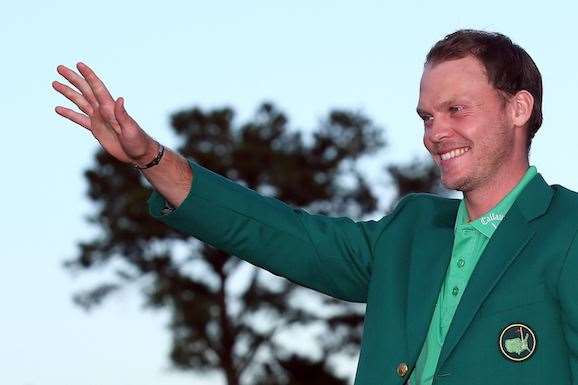 Danny Willett clinically compiled a closing 67 reminiscent of Nick Faldo’s overhauling final round two decades ago. Willett joins Faldo as the only English winners of the Masters.
Danny Willett clinically compiled a closing 67 reminiscent of Nick Faldo’s overhauling final round two decades ago. Willett joins Faldo as the only English winners of the Masters.PHOTO: David Cannon/Getty Images
After he made a fourth straight birdie at the 9th hole, Spieth zoomed five strokes clear of Willett and the closing nine holes appeared to be a matter of not who, but by how many. Then something strange happened, something we’re yet to see from Jordan in his embryonic career. His miscues began to punish him on the scorecard – and then he panicked and made the big mistake of rinsing two balls in Rae’s Creek at the 12th for a sinister quadruple-bogey.
Meanwhile, Willett compiled a Nick Faldo-like round as one of three Englishman to shoot 67 on Sunday. Just like Faldo in 1996, it was a best-of-the weekend 67 that likely won’t be remembered as much as the implosion by the vanquished player. Not that Willett minds.
“You never feel comfortable on this golf course until you finish and sign the card and post a number,” Willett said, referencing the pitfall that befell Spieth. “So yeah, we knew we still had a job to do. At the time we were still only four‑under-par and he had only dropped back to one-, so there’s still plenty of holes for him to catch up and keep chasing.
“It was really timely birdie on 16, and then again to make contact up 17 and 18 with what goes on and to hit such a nice chip that I did on 17, yeah, it’s just them things,” added the Yorkshireman. “You practise, that’s what you do. Endless hours chipping, putting, hitting shots, imagining hitting shots at certain golf courses at certain times. And fortunately enough today, I’ve been able to relive some of them dreams and some of them practice sessions.”
Willett becomes the fifth player to win the Masters at their second start after he shared 38th on debut last year. The last player to do that was Spieth a year ago and before that Charl Schwartzel in 2011.
It’s been a meteoric rise for the 28-year-old from Sheffield in the eyes of local patrons in Augusta, but avid golf fans saw this coming. He won the English Amateur in 2007 and the 2008 Australian Amateur Strokeplay Championship en route to representing England at the Eisenhower Trophy in Adelaide that year as the game’s top-ranked amateur. As a pro, he pushed Rory McIlroy all the way in last year’s Race to Dubai, finishing third at the WGC–Match Play along the way. He entered this week ranked 12th in the world. With an early set to his swing, Willett’s action appears unconventional but it is technically sound and definitely effective. At Augusta this week he credited a sound mindset among the reasons for the victory.
“We’ve been good mentally this week. Been going through good processes,” Willett said. “This golf course can jump up and bite you whenever. Even today, it was relatively flat calm compared to the past few days, but there was just enough there to flicker around to cause a few problems.”
After birdies at the 6th and 8th going out, Willett still trailed Spieth by five strokes. Then in just 50 minutes, the tables turned so dramatically that the five-shot deficit flipped to a four-shot lead. He two-putted for birdie at the par-5 13th, added another after a pinpoint approach at the next and made his fifth and final birdie of the round at the par-3 16th to reach the winning score of five-under.
Behind him, Spieth made no pars from the 4th to 14th holes and only six for the day. He birdied four holes in a row to close the front nine, but bogeyed 10 from the greenside bunker and 11 after a wayward drive to the right. Still leading by two, he made the Norman-like error by washing his tee shot at the 12th in Rae’s Creek and ignominiously dumped a second ball in the water to make a quadruple-bogey, dropping six shots in three holes. Recovery birdies came at the two par-5s but a final bogey at 17 sealed his fate.
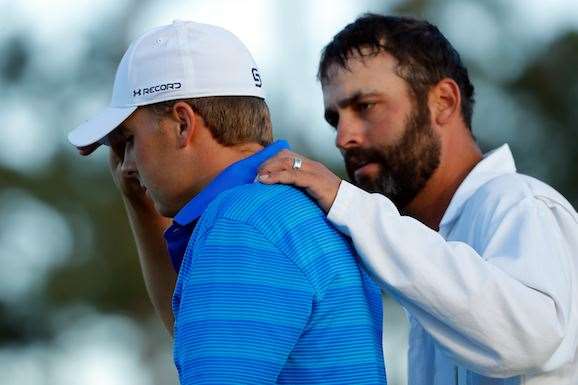 Caddie Michael Greller commiserates with Jordan Spieth, who uncharacteristically unravelled in a madcap half-hour from the 10th to 12th holes.
Caddie Michael Greller commiserates with Jordan Spieth, who uncharacteristically unravelled in a madcap half-hour from the 10th to 12th holes.PHOTO: Kevin C. Cox/Getty Images
Spieth has spent an inordinate time in or near the lead in majors in recent times and the pressure finally found him. His position after his past 19 major rounds has been: 1st, 1st, 1st, 1st, 7th, 1st, 1st, 1st, 8th, 14th, 4th, 4th, 24th, 7th, 2nd, 2nd, 1st, 1st, 1st and now 2nd.
Others to play cameos on this wacky Sunday included Lee Westwood, who at nearly 43 looked to have seen the sun set over his shot at major glory. But there he was, pitching in for eagle at the 15th while playing alongside Willett to draw within a stroke as Spieth’s calamities unfolded behind them. Alas, a three-putt at the next and Willett’s birdie relegated Westwood to a tie for second with Spieth. Dustin Johnson, who out-ball-struck everyone in the field this week, moved into the frame with birdies at the two back-nine par-5s before double-bogeying the 17th.
The 80th Masters ended with a fizz rather than a bang for the three Australians to make the cut: World No.1 Jason Day, 2013 winner Adam Scott and debutant Cam Smith. Day began the round at even-par, as did Willett, as he sought to become the first World No.1 to win the Masters since Tiger Woods in 2002. Greeted by far more agreeable conditions than the past three days, Day began slowly, not making a birdie until the downwind par-5 8th, to shoot a one-over 73. Day traditionally struggles on the front nine at Augusta and plunders the back. This week, he was inversely eight-under going out and nine-over coming home.
“Pretty much the whole week I was just out of position, for the most part,” said Day, who reached the winning score of five-under-par after just nine holes of this Masters. “Kind of disappointing week, from tee to green. On the green was great when I gave myself the opportunity I felt like I could capitalise on, but today I didn’t give myself the opportunity.
“The first few days were a good grind for me. But today from tee to green today wasn’t that good. It wasn’t bad, but it wasn’t great. And then when you’re out of position and you don’t quite give yourself the opportunities, it’s tough to get any sort of score going.”
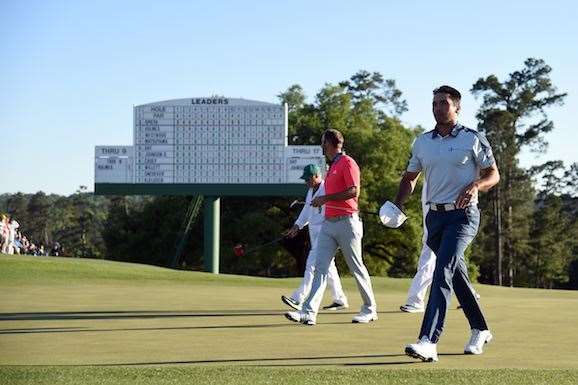 Jason Day began Sunday only three strokes behind and tied with Willett only to card a sombre 73 to share tenth place.
Jason Day began Sunday only three strokes behind and tied with Willett only to card a sombre 73 to share tenth place.PHOTO: Harry How/Getty Images
Scott continued his birdie shortage on Sunday and threw in too many bogeys to break par, including water balls at the 12th and 13th. He rounded out a lacklustre week with a 76 to walk away 11-over and echoed Day’s sentiments.
“Today was just a continuation of the week, really,” Scott said. “I’m a little disappointed with today’s round. It started well, but I had about three three‑putts, I think. And kind of from nowhere and just a bit sloppy. I got to the point somewhere in the round where the reality set in that I’m not going to do anything special and that intensity dropped and this course bites you, which was a little bit disappointing. I’d like to take something out of the week. I’m not sure what it is yet. But I’ll be looking for some better form going ahead.”
Smith, meanwhile, partnered British Amateur champion Romain Langasque, who ripped apart the back nine in 31 as the Queenslander compiled a steady 74. He turned in two-under but spluttered home in 39 for a 15-over total.
“It’s definitely harder than I thought,” Smith said of his first Masters. “Not generally the course, just the conditions. Rarely do you see winds like we had the first three days on TV. I was coming in expecting it to be tough, but the conditions itself to be relatively easy and it definitely wasn’t that.”
One takeaway from this edition of the Masters is that all the preparation in the world, all the pre-tournament visits and all the talk from January onwards about form leading up to the year’s first major goes out the door when the weather catches the competitors by surprise. Much like at other rough-weather majors, the players who best adapted their games and their strategy to suit the more US Open-like conditions fared best. Unsurprisingly, the more enterprising European players filled many of the top spots on the final leaderboard.
The congratulations for Willett now accompany the commiserations for Spieth, to whom the attention turns to see how he reacts.
“This is tough. It’s tough. Very tough,” Spieth said in the immediate aftermath. “It was a tough 30 minutes for me that hopefully I never experience again.
“Yeah, it’s a tough one. I knew the lead was five with nine holes to play,” he added with the benefit of some time to recompose. “And I knew that those two bogeys [at the 10th and 11th holes] weren’t going to hurt me. But I didn’t take that extra deep breath and really focus on my line on 12. Instead I went up and I just put a quick swing on it.
“Listen, I had my B‑minus game tee-to-green and I made up for it around the greens with my putter. Ultimately you just have to have your A game every single part, and I just didn’t have those iron swings, as it showed on the back nine.”
Or, for a completely left-field view, come the words of that wily old curmudgeon Peter Alliss, who said: “Watching Jordan Spieth play golf reminds me of listening to Willie Nelson. He can’t sing at all, but makes great records.”
Sadly, this particular record is broken but the music won’t stop. No player displays more resiliency during the course of a round than Spieth. Now the test becomes not how he rebounds on the next hole or next round, but the manner in which Spieth responds overall to the first glaring loss of his career. Somehow, we get the feeling he’ll be just fine.
And the last time the Masters was played in cold, windy, firm conditions? It was 2007 when a fellow named Zach won it. The Willetts clearly knew something.
SEEN & HEARD
* YOUR correspondent arrived early at Augusta National on Sunday, nearly three hours before a shot would be struck, partly to watch the grounds crew go to work. The bunker raking was immaculate and the attention to detail of the highest degree in every facet of the preparation phase. However, by far the most commendable aspect of the set-up was the hole locating process. The flag on the 18th green was in its traditional front-left position – as it is most years and, indeed, has been every year since 2004 – but the tape measures came out to determine the precise part of the green for the cup. For the record, that location is ten yards from the front of the green and four yards off the left fringe.
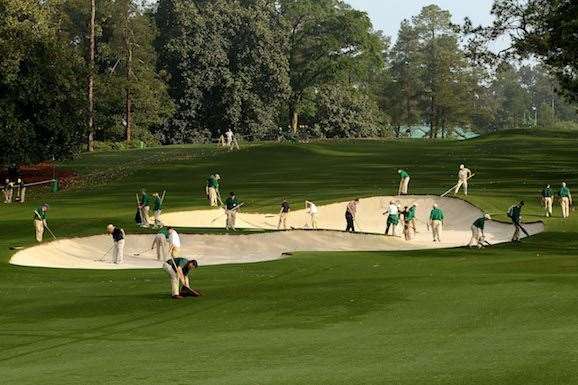
* SYDNEY-BASED player manager Tony Bouffler was also out early, wandering the golf course before play. He’s been coming to the Masters since 1999 and says one of the biggest changes from a spectator perspective is the amount of Australians in the gallery these days. “In ’99, the sound of an Aussie accent would make you stop completely and I’d take a minute to talk with whoever it was. Now you hear the accent so much it comes as no surprise.” Also present this week were the Fanatics, those exuberant, globe-travelling sports nuts. They’re more subdued here yet were politely asked to tone things down at times.
* LOUIS Oosthuizen came to Augusta among the favourites and began Sunday four-over par and seven strokes behind. In something of an omen, the magnetic strip displaying his hole-by-hole scores in the media centre tumbled off the wall this morning and bounced off a box full of numbers for the board. Several hours later, the South African authored one of the most bizarre holes-in-one in Masters history when he aced the 16th (one of three players to do so on Sunday) by ricocheting his ball off playing partner J.B. Holmes’ sphere. Oosthuizen finished this Masters with a 71 for a three-over aggregate.
* CAM Smith went out in the second group of the day at 9:55am. Walking beside the 11th hole two hours or so later, the Brisbane professional’s entourage grew thirsty. Des Smith, the golfer’s father, reminded another member of the Smith brigade that “they don’t serve beer today until 12:30”.
* STATS, Jordan Spieth’s swing coach Cameron McCormick recently said, are like bikinis: they reveal a lot but they don’t show everything. This week, one of the best stats emerged as the final round began. Spieth and Kevin Na had each hit 32 of 54 greens in regulation for three rounds, yet Spieth led the tournament and Na was outright last at 15-over. Part of Na’s problem was a five-putt on the 14th green in the third round.
Related Articles
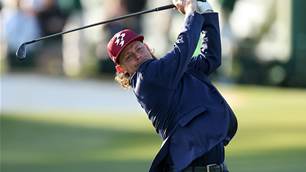
Tips are in! Experts predict Masters winners, long-shots and no-hopers
